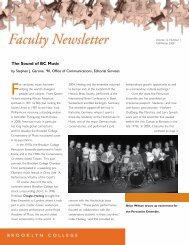Graduate Bulletin 2011–2012 - Brooklyn College - CUNY
Graduate Bulletin 2011–2012 - Brooklyn College - CUNY
Graduate Bulletin 2011–2012 - Brooklyn College - CUNY
You also want an ePaper? Increase the reach of your titles
YUMPU automatically turns print PDFs into web optimized ePapers that Google loves.
26 Academic Regulations and Procedures<br />
be credited toward a second master’s degree or advanced<br />
certificate at <strong>Brooklyn</strong> <strong>College</strong>. Furthermore, it applies only<br />
to courses that are required by the second program; courses<br />
taken in the first program may not be applied toward elective<br />
credits in a second program. If a program chooses to credit a<br />
student’s <strong>Brooklyn</strong> <strong>College</strong> coursework, as described above,<br />
toward a second master’s degree or advanced certificate, the<br />
department chair, graduate deputy, or program head must<br />
specify the same in writing to the Registrar.<br />
Attendance in courses<br />
The instructor may consider attendance and class participation<br />
in determining the term grade, although a student is<br />
not denied credit for a course solely on the basis of the<br />
attendance record. It is the student’s responsibility to turn in<br />
all assignments on time.<br />
A student late for class may be excluded from the classroom.<br />
To obtain a grade for a course that was not completed due<br />
to enlistment in the armed forces, Peace Corps, or VISTA, a<br />
student must have been enrolled for approximately 13 weeks<br />
during the fall or spring term or five weeks during the<br />
summer term.<br />
Appeal of final grade<br />
An instructor may not raise a student’s grade in a class by<br />
accepting additional work after the end of the semester,<br />
except in cases of INC grades (see the section “Grades in<br />
courses,” above) in which the student either takes a makeup<br />
final or submits the limited number of assignments still due<br />
at the end of the semester. In any other cases, a change of<br />
grade can be made only if the instructor certifies that an<br />
error was made in entering or calculating a grade. If the grade<br />
change is less than two semesters old, the instructor may<br />
do an electronic change of grade through the department. If<br />
older, the instructor must complete a Change of Grade Form<br />
that must be signed by the instructor and the department<br />
chairperson, and the form must be approved by the Office of<br />
the Associate Provost for Academic Programs..<br />
A student who thinks a final grade is incorrect should consult<br />
the instructor immediately after learning the grade. If the<br />
instructor does not recommend a change of grade, a student<br />
may request a review by the Departmental Grade Appeal<br />
Committee or the department chairperson, who will convene<br />
a review committee. If the committee and the instructor do<br />
not come to an agreement on a grade change, the student<br />
may make a final appeal to the Faculty Council Committee<br />
on <strong>Graduate</strong> Admissions and Standards. Grade appeals to this<br />
committee should be made within 30 days of the decision<br />
of the departmental committee; they may not be initiated<br />
later than two years from the end of the term in which the<br />
course was taken. Appeals older than two years will not be<br />
considered unless there are legitimate, cogent and<br />
documented reasons for the student’s not taking action sooner.<br />
Option One: Informal appeal. Students who believe<br />
that they have received an unfair or inappropriate grade are<br />
required to meet with the instructor of record to attempt<br />
to resolve the matter informally. The student must explain<br />
the grounds for the grade appeal to the instructor and<br />
attempt to understand the instructor’s reasons for assigning<br />
the grade. The purpose of the meeting is to reach a mutual<br />
understanding of the instructor’s rationale for the grade and to<br />
resolve differences in an informal and cooperative manner.<br />
Option Two: Formal appeal. If the matter is not<br />
resolved, the student has the right to appeal the grade to the<br />
department chairperson or designee. When the department<br />
chairperson or designee receives a formal grade appeal<br />
following the student’s informal appeal to the instructor, the<br />
chairperson or designee may attempt mediation and upon<br />
failure of mediation, the chairperson or designee shall convene<br />
a Grade Appeals Committee to investigate the appeal and to<br />
render a decision. To assure that all departmental committees<br />
conform to the principles of due process, the following<br />
procedures apply:<br />
1. The student must submit a completed form to show<br />
that he/she has met with the instructor and that informal<br />
resolution failed.<br />
2. The student must submit all relevant documentation<br />
to show that he/she has met the course requirements,<br />
including, but not limited to, a) course syllabus, b) all<br />
documented grades (graded tests, papers, projects, etc.),<br />
and c) a list of all other grades that the student knows he<br />
or she received in the course and any other factors that<br />
may have influenced the grade.<br />
3. The Grade Appeals Committee has the authority to screen<br />
out appeals that do not set forth the aforementioned<br />
ground for appeal. The convener will explain any such<br />
finding in writing to the student, the faculty member, and<br />
the department chairperson.<br />
4. The department chairperson will notify the instructor that<br />
a formal grade appeal has been initiated and the instructor<br />
shall provide the grade distribution break down for the<br />
student and any other relevant information.


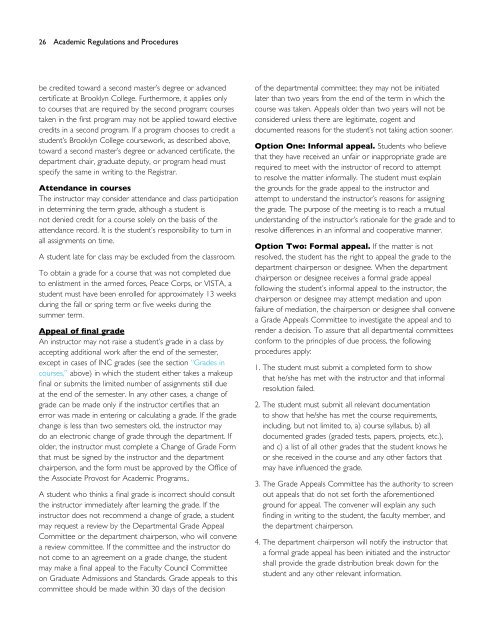
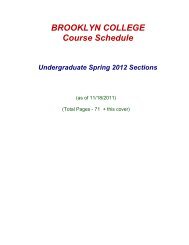

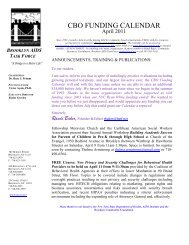
![PHIL 3314: Moral Issues in Business [Lindsay] - Brooklyn College ...](https://img.yumpu.com/12442928/1/190x245/phil-3314-moral-issues-in-business-lindsay-brooklyn-college-.jpg?quality=85)
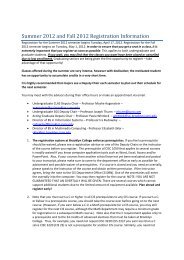

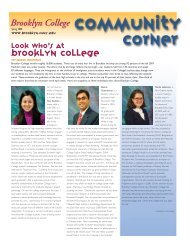

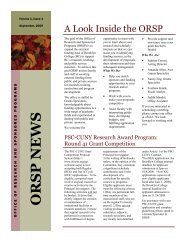
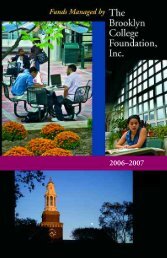
![CORC 3306: Scientific Revolutions [Menser] - Brooklyn College ...](https://img.yumpu.com/5776630/1/190x245/corc-3306-scientific-revolutions-menser-brooklyn-college-.jpg?quality=85)

![PHIL 3309: Environmental Ethics [Menser] - Brooklyn College - CUNY](https://img.yumpu.com/5776371/1/190x245/phil-3309-environmental-ethics-menser-brooklyn-college-cuny.jpg?quality=85)
